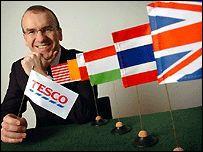
Tesco has enjoyed its strongest Christmas trading for three years buoyed by a double Clubcard points deal.
In the UK, total sales outperformed the industry as a whole, increasing by 8.3 per cent compared with the same period last year (8.0 per cent excluding petrol). Like-for-like sales excluding petrol and including VAT increased by 5.1 per cent in the period (4.9% per cent VAT-adjusted), all of which was volume growth.
The retailer’s Finest range in food also delivered a strong performance and online sales were very strong in both food and non-food with total online sales growth approaching 20 per cent in the six-week period.
Tesco offered double points on its Clubcard loyalty scheme, which contributed 0.7 per cent to the sales growth.
Meanwhile, group sales increased by 7.5 per cent at constant exchange rates (6.9 per cent at actual rates) in the six weeks to 9 January 2010, and overseas businesses saw continued growth over the Christmas and New Year period, delivering a total international sales (excluding petrol) increase of 4.1 per cent at constant exchange rates and 2.4 per cent at actual exchange rates. Like-for-like sales in Asia, Europe and the United States have continued the improving trend of the third quarter.
In Europe, sales grew by 0.8 per cent at constant exchange rates (excluding petrol) and decreased by 2.2 per cent at actual rates (excluding petrol). In Asia, sales increased by 7.8 per cent at constant exchange rates and 8.0 per cent at actual rates.
In the United States, Fresh & Easy had a stronger Christmas and New Year period than last year, with total sales growth of 35 per cent at constant exchange rates (24 per cent at actual rates) and strongly positive like-for-like sales growth.
Tesco ceo Terry Leahy, said: “We’ve delivered a very strong performance over the Christmas and New Year period. It was a great Christmas for Tesco customers with an excellent seasonal range in store and online. The Tesco team delivered a great shopping trip for customers and I’d like to thank all our staff and also our suppliers for their tremendous efforts, particularly during the freezing weather.”
The market-leader’s performance is better than forecast by analysts and now some believe this could spell the end of the price-war era. Paul Mumford, senior fund manager at Cavendish Asset Management said: “ Tesco’s results will give succour to the UK’s beleaguered retail sector, and further credence to the notion that the UK economy is finally heaving itself out of recession. Its UK sales figures are particularly heartening. A strong domestic performance will help Tesco fund its expansion plans overseas, which is surely where its future growth potential lies.”
Tesco’s results follow positive posting from Sainsbury’s last week and Morrisons is expected to report a strong performance in the next few weeks. Mumford said these figures are surprising: “What is remarkable about the trading figures we have seen across the supermarket sector is their sheer strength in a still fragile economic recovery. In addition to the severe constraints one would expect on consumers’ purse strings in the current environment, the sector has also had to contend with a sustained battered pound.
“When the pound first began its prolonged slide, there were real fears in the market that this would put significant pressure on supermarkets’ margins given our increased dependence on food imports….However, supermarkets have navigated the economic backdrop well, with a gradual détente in the intensely competitive price wars that characterised the sector in the boom.
“As the good times gave way to more trying conditions, enthusiasm for pre-emptive discounting appears to have waned, replaced by a more reactive approach to price cutting. In short, the price wars of yore have become markedly less frequent and more limited in scope. The levels of undercutting witnessed previously were symptoms of a race to the bottom in terms of cutting excess fat, but now there is simply no excess fat to spare.
“This has given our major supermarkets the breathing space required to edge up prices to cope with the economic malaise. No doubt they have been helped by other factors too, including consumer fatigue with the recession, and the growth of non-food sales in the face of rivals such as Woolworths exiting the High Street. While the grocery sector will always be competitive, the zeal for undercutting has been replaced by more tactical discounts, going some way to explain why Christmas figures have been so positive across the board.”



